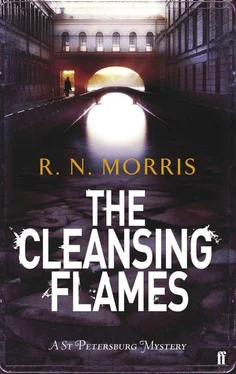R. Morris - The Cleansing Flames
Здесь есть возможность читать онлайн «R. Morris - The Cleansing Flames» весь текст электронной книги совершенно бесплатно (целиком полную версию без сокращений). В некоторых случаях можно слушать аудио, скачать через торрент в формате fb2 и присутствует краткое содержание. Год выпуска: 2011, ISBN: 2011, Издательство: Faber and Faber Fiction, Жанр: Исторический детектив, на английском языке. Описание произведения, (предисловие) а так же отзывы посетителей доступны на портале библиотеки ЛибКат.
- Название:The Cleansing Flames
- Автор:
- Издательство:Faber and Faber Fiction
- Жанр:
- Год:2011
- ISBN:0571259154
- Рейтинг книги:5 / 5. Голосов: 1
-
Избранное:Добавить в избранное
- Отзывы:
-
Ваша оценка:
- 100
- 1
- 2
- 3
- 4
- 5
The Cleansing Flames: краткое содержание, описание и аннотация
Предлагаем к чтению аннотацию, описание, краткое содержание или предисловие (зависит от того, что написал сам автор книги «The Cleansing Flames»). Если вы не нашли необходимую информацию о книге — напишите в комментариях, мы постараемся отыскать её.
The Cleansing Flames — читать онлайн бесплатно полную книгу (весь текст) целиком
Ниже представлен текст книги, разбитый по страницам. Система сохранения места последней прочитанной страницы, позволяет с удобством читать онлайн бесплатно книгу «The Cleansing Flames», без необходимости каждый раз заново искать на чём Вы остановились. Поставьте закладку, и сможете в любой момент перейти на страницу, на которой закончили чтение.
Интервал:
Закладка:
It was almost as if the flames were waiting for him. They lapped out towards his face as he opened the stove, their eagerness spilling out with a hungry crackle.
Generally, he kept the fire low. The stove was efficient. As long as he maintained it, a small flame was enough to keep the chill from his room, even in winter. The days were warmer now, but a night frost could still surprise.
But the fire in his stove was more than the means by which he warmed his room. It was a small, intense fragment of the greater fire. Staring into it, he imagined himself back in the time of that first revolution, when fire had just been discovered, and those who knew how to create and control it had power over their fellows. One could share or withhold. In the same way, one could use it benignly or destructively. Human nature being what it was, the jealous, destructive choice would always prevail. There was something, too, in the nature of fire that demanded this.
Virginsky moved his copy of ‘God the Nihilist’ towards the aperture of the stove and fed the handbill quickly into the consuming flames.
He put the rest of the manifestos back into the trunk and pushed it under his bed. A moment later, he put on his overcoat and went out.
*
Instinct drew Virginsky to the filthiest, darkest drinking dens on and around Haymarket Square. That is not to say that he narrowed his search down to any meaningful degree. It would have been hard to find taverns in the district that did not fit that description.
He bought a five-kopek measure of vodka in each place he visited, which he drank quickly. After six taverns, he gave up all hope of finding the man. Frankly, it was a relief to do so, as he had no clear idea what he would say to him if he did find him. The more the evening wore on, the more likely it was that he would say something inept and revealing, thereby making a fool of himself, and also, possibly, placing himself in danger.
His plan, such as it was, had been flawed from the outset. After all, it was perfectly possible for the man to enter a tavern he had already visited, the moment after he had left it. Their paths need never cross. As an investigative technique — if that was what it was — it was hardly more sophisticated than stumbling around aimlessly.
And so Virginsky gave himself up to drinking and abandoned any pretence of looking for the hatchet-headed man who had given him the manifesto.
Then it came: the hand on the shoulder, the voice in the ear, the plunging vertiginous lurch of fate — or something worse, doom — and he realised that he had never wanted to find this man, who had now found him.
‘My friend, we meet again.’
Virginsky hid his panic with feigned blankness.
The man’s mouth spiked on one side sarcastically; the suddenly familiar expression took Virginsky back to the night of Easter Sunday. ‘You mean to say, you were not looking for me?’
‘I. .’ But Virginsky was at a loss for a convincing lie.
‘Still and all, you found me.’ The man increased the angle of his sarcasm.
‘Very well,’ said Virginsky. ‘Let’s say I was looking for you. Now I have found you. What next?’
‘Come over and join me. I have a table in the corner. Away from prying ears.’
‘Are you here alone?’
‘Are you here as a magistrate?’
‘You remembered.’
‘It would be hard to forget. I was here with some friends, but. .’ The man looked around, scanning the scattered drunks, indistinguishable with their expressions of glassy-eyed stupor. ‘They have gone. Come on. I will introduce you to their shadows.’
On the way to the corner, Virginsky almost fell over as his foot caught against some obstacle on the floor. He looked down and in the dim candlelight could just about make out a man sprawled face-down, unconscious.
As he took a seat on a rickety chair, he felt but could not see the layer of grime on the table. ‘To answer your question. . no. I am not here as a magistrate.’
‘Then what?’
‘I was very interested in the poem you gave me.’
‘Yes. Go on.’
‘And what you said, about hunger. . the hunger you saw in my eyes. I think it’s true. I do have that hunger.’
‘And what would you do with it?’
‘I wish to serve the cause.’
‘The cause?’ The man’s mocking laughter scythed the air. He became abruptly serious: ‘Do you even know what the cause is?’
‘Revolution.’
‘Just a word. Is it not?’
‘At the moment, perhaps. But it is my earnest desire to turn that word into an act.’
‘So? What do you want from me?’
‘You. . are close to those directing this great. . endeavour. . are you not? I am not wrong in thinking that?’ There was a pleading note to Virginsky’s question.
The man did not immediately reply. Behind the circular lenses of his spectacles, his eyes narrowed in assessment. At last he said, ‘Have you changed your views?’
‘My views?’
‘The last time we met, you said that you could not condone the loss of life.’
‘There are other means of achieving destabilisation, are there not?’
‘What do you have in mind?’
‘The circulation of manifestos, such as that you handed to me. Education, in other words.’
‘That is just the beginning. Words can only convey so much. There is a point at which it is necessary to translate them into deeds.’
‘But must they necessarily be violent deeds?’
‘Not all will be violent. There is a range of action in the revolutionist’s repertoire. Vandalism, sabotage, the desecration of churches. One method that we have used with some success is the introduction of counterfeit banknotes. It all falls under the rubric of propaganda. Even acts of violence. Everything carries a message — the message being that the Tsar is losing his grip on power. But we must use all means. You cannot pick and choose. If you are called upon to act for the cause, you are not at liberty to discriminate on the grounds of squeamishness.’
‘But surely it makes sense to use each according to his abilities, and opportunities.’
The hatchet-headed man considered this, and finally nodded in agreement.
‘I am a magistrate,’ went on Virginsky. ‘I work for the Ministry of Justice. I have access to official documents. Briefings, reports. . orders.’
The man nodded thoughtfully. ‘Bring us something. Something useful. Then we will see.’
‘What?’
‘I will leave it to your discretion.’
‘How will I get in contact with you again?’
‘You found me now, didn’t you? You will find me again.’
‘But it’s. . that’s. .’ Virginsky wanted to give in to the vodka swoon that was making it hard for him to string his words together.
‘What?’
A great effort of concentration led to sudden clarity: ‘Surely we cannot afford to leave it to chance like that?’
‘Don’t worry your head, my magistrate friend. If you can’t find me, I know where to find you.’ Although the man was smiling, it was his usual one-sided leer of sarcasm, which only served to accentuate the hint of a threat in his words.
The Devil’s Professor
The following day, a large envelope arrived for Porfiry Petrovich from the office of Russian Soil and Russian Era . A number of folded rectangles of newsprint slumped out limply like so many dead butterflies, landing in a heap on his desk. Porfiry spread them out, sorting them first by size, then resorting them in chronological order. There were about thirty to forty snippets of paper, with articles going back approximately three years. A covering letter from Trudolyubov explained that these were all the articles that had appeared in his publications written by the journalist he knew as ‘K.’
Читать дальшеИнтервал:
Закладка:
Похожие книги на «The Cleansing Flames»
Представляем Вашему вниманию похожие книги на «The Cleansing Flames» списком для выбора. Мы отобрали схожую по названию и смыслу литературу в надежде предоставить читателям больше вариантов отыскать новые, интересные, ещё непрочитанные произведения.
Обсуждение, отзывы о книге «The Cleansing Flames» и просто собственные мнения читателей. Оставьте ваши комментарии, напишите, что Вы думаете о произведении, его смысле или главных героях. Укажите что конкретно понравилось, а что нет, и почему Вы так считаете.












